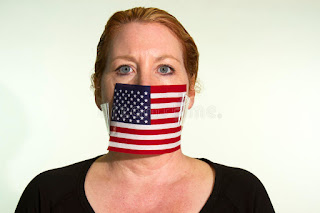Blog Post #3: Eight Values of Free Expression
The most important value of free expression in America right now is the promotion of dissent. The promotion of dissent states that our government protects citizens' opinions despite their differences, even if it is a critic against the government. Furthermore, these critics are encouraged because it is considered a patriotic duty to do so. Therefore, in modern-day America, there is no shortage of opinions criticizing the government due to political polarization. The political divide makes the promotion of dissent crucial to keep America from going into chaos and complete censorship. This is especially the case for the 2020 presidential debate that occurred, which further divided the nation because the issue of Biden vs. Trump is more than just politics. In social media, differing views are all over, incorporating the other value of free expression, promoting tolerance from dissenting opinions. When differing options arise, it is beneficial to see how our viewpoints form and why that individual believes a certain way. Additionally, learning why others think a certain way will make society more innovative and learn from it since it won't be a one-sided argument. It is a lesson for our society and serves as a teaching moment about acceptable behavior.
The promotion of tolerance is the value of expression that most resonated with me because I struggle to understand viewpoints that differ from mine. However, it is not that I am closed-minded about it, but more of wanting to see the evidence. Additionally, I believe others do as well, so there are so many problems discussing "controversial" topics such a politics. Therefore, these dissenting opinions should not be censored by social media platforms or the media in general.
There has been a long history of censorship in America. Some of which we have mentioned in class. A prime example of enforced censorship would be the sedition act of 1798 made criticizing the government a crime. Nowadays, criticizing the government is wholly protected. In terms of the amount of censorship that exists in social media, it is impossible to determine. However, the percentage of censorship in social media people believe is in place varies depending on which demographic groups you ask. For example, 90% of Republicans and Independents who lean towards the Republican Party say it's at least somewhat likely that social media platforms censor political viewpoints they find objectionable, which is up slightly from 85% since 2018. Another interesting fact from the results of this survey is that 73% of Democrats say they strongly or somewhat approve of social media companies labeling posts on their platforms from elected officials as inaccurate or misleading. In comparison to 71% of Republicans say they at least somewhat disapprove of this practice. The disparity between the two parties could be around for several reasons. The main reason could be attributed to "fake news," which is where false information is spread through different platforms. "Fake news" is extremely harmful in America due to the public's misinformation about critical governmental issues. Additionally, "fake news" can come in many forms, such as satire or clickbait, but could be interpreted as the truth which is another issue that needs to be resolved.





Comments
Post a Comment